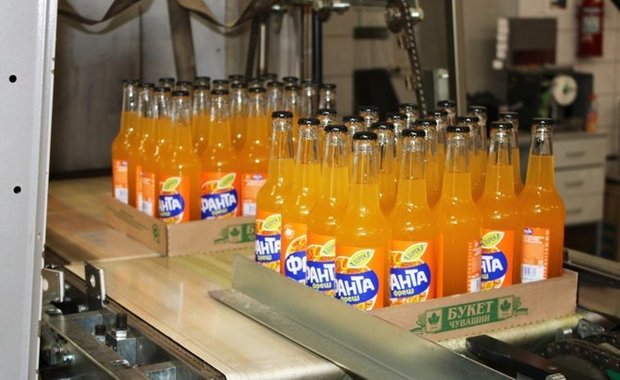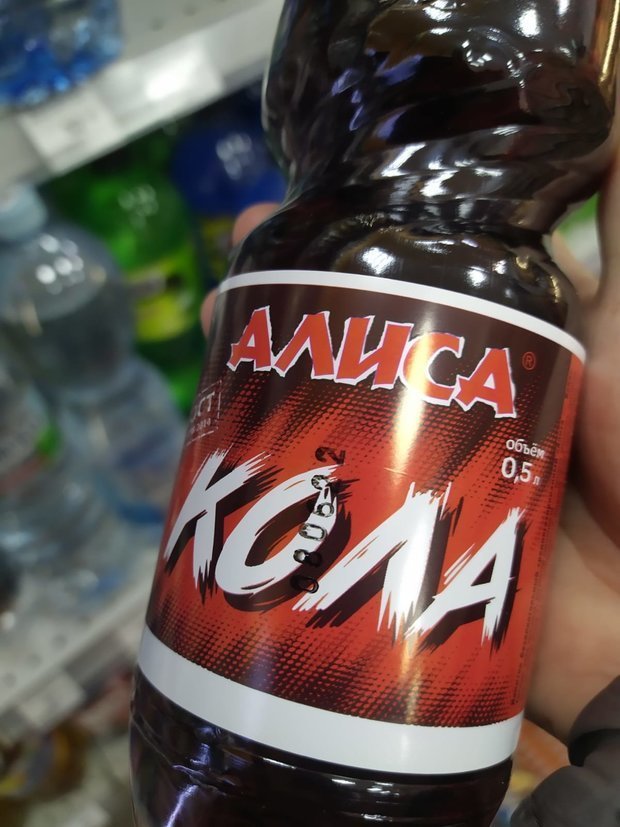Cola by Volzhanka, Fanta by Bouquet of Chuvashia: brands replaced
A new window of opportunity has opened for Russian producers of beer, juice, and water after the withdrawal of Western players
Since PepsiCo and Coca-Cola announced the termination of their activities in Russia, domestic beverage manufacturers have joined the fight for a vacant niche in the market and begun to produce analogues of popular imported sodas. Moreover, the copyright holders of the brands have banned the import of original products to our country, even through Kazakhstan. So, the Bouquet of Chuvashia plant began bottling Cola and Fanta, and if the commercial risks are justified, the holding can also attract its enterprise in Naberezhnye Chelny, Bulgarpivo, to the experiment. “Previously, no one dared to get involved, as international giants put pressure with strong marketing, and now sales are growing by leaps and bounds," the Volzhanka enterprise in Ulyanovsk, where they also sell their Cola, shared with their optimistic attitude with Realnoe Vremya. However, experts doubt that they will be able to reproduce the authentic taste of drinks in Russia.
Cola by Chuvash brewers
Chuvash brewers have made an attempt to enter the empty market of popular carbonated drinks, whose capacity was occupied for several decades by American companies Coca-Cola and PepsiCo, who had to leave because of the international sanctions policy against Russia. The Bouquet of Chuvashia brewing company of the deputy of the regional parliament, Oleg Meshkov, decided to occupy the vacant shelves.
The bottling of new soft drinks with the flavours of Fanta and Cola has begun at the plant in Cheboksary. The products have already appeared in some retail chains and stores in the city. Besides, the company plans to supply drinks to other regions of the Volga region.
In the Ministry of Agriculture of Chuvashia, the correspondent of Realnoe Vremya was informed that there is a test bottling of carbonated drinks so far, therefore, production volumes have not been determined. According to officials, further sales of products will depend on how successful the sales of beverages in retail chains will be.
Tatarstan has also been included in the geography of supplies, as one of the major consumers of carbonated beverages. Information about this was confirmed to Realnoe Vremya by the head of the Beer Association of the republic, Rinat Akchurin.

He did not talk about how the automotive city reacted to the idea of setting up the production of Fanta and Cola. But he admitted that the Tatarstan brewery could start developing the production of these products after the experiment was “run in” in Cheboksary.
“If it goes well in Chuvashia, then why not produce it in Tatarstan. It's quite possible, but it's a matter of time," Akchurin believes.
“It's probably a fake," or What our brewers are afraid of
Doubts of Tatarstan brewers are connected with that it is unlikely to reproduce the authentic taste of Cola and Fanta, and the mass buyer will be skeptical of domestic analogues. “Indeed, we see that with the withdrawal of foreign companies, the market of popular carbonated drinks has cleared. There are remains on the shelves, or what was brought from Kazakhstan. In fact, the shelves are really empty. And the one who is faster decided to risk entering the empty space. This topic is interesting," the head of the association agrees.
But there are also pitfalls in this. According to Rinat Akchurin, commercial risks in the implementation of Russian analogues of Western brands are associated with that you can “not get into” consumer preferences.

“There is a very peculiar risk here, because our consumer is spoiled. Firstly, they will definitely compare with the authentic product. Well, there is a bottle with the name “Cola” on the shelf. What will you think? Well, that's probably a fake. And, probably, you will not dare to buy it. But even if you do, you will still compare it with the original drink. Secondly, the free promotion of products may be hindered by supplies from Kazakhstan, where the production of original beverages is preserved. And the buyer will decide to take the Kazakh Coca-Cola," Akchurin listed the main difficulties.
However, PepsiCo has already banned the supply of its products to Russia even through Kazakhstan.
Who pushed American Coca-Cola off the shelves
In March 2022, the American Coca-Cola Corporation stopped producing carbonated drinks under its brand in Russia. The official announcement was published on the company's website. The statement says that the distributor's customers in Russia are now in the process of selling off the remaining products, and when the stocks run out, they will not produce and sell new ones.
In addition to Coca-Cola, the company produced drinks under other brands: Fanta, Sprite, Powerade, Schweppes, Burn, BonAqua water. In Russia, the American company operated 10 factories in Moscow, Moscow Oblast, St. Petersburg, Samara, Yekaterinburg, Rostov Oblast, Novosibirsk, Krasnoyarsk and Vladivostok. In the first months after the company's announcement, its products could still be found on sale, now the remains are finishing.
The vacant store shelves have been occupied by Russian manufacturers, who promptly adjusted the production of analogues, copying even the appearance of imported drinks. Recently, NielsenIQ research company has reported that there have become more Cola-flavoured drinks in Russian retail chains.

Instead of the previous 169 brands, 186 brands appeared in trade. Moreover, calculations were carried out on commodity items that had “non-zero sales," analysts noted.
One of the first to develop this production was the Ochakovo brewing company, which in May released its analogues of foreign brands — CoolCola, Fancy and Street. Next, Chernogolovka, a producer of soft drinks near Moscow, announced that it was going to occupy 50% of the Russian market, the volume of which is approaching $9 billion. To meet the growing demand, the company is building the Aqualife plant in Moscow Oblast worth 3 billion rubles. The first stage of construction is planned to be completed in March 2023.
“Coca-Cola installed refrigerators in almost every basement”
“No one had messed with them [Coca-Cola] before, as the international giants put pressure with strong marketing. The foreign manufacturer gave substantial discounts, installed refrigerators in almost every basement, filled up with equipment and other privileges. A lot of money was invested in increasing the motivation of sellers and expanding sales channels. Therefore, no one tried to get involved in this race, because they knew that they would definitely lose," they explain the activity of Russian players in the Ulyanovsk enterprise for the production of mineral and drinking water Volzhanka. “The main producers stood aside, knowing full well that there was no point in getting involved in the battle of giants.
Unlike Russian brewers, Volzhanka in Ulyanovsk started producing an analogue of Cola three years ago. According to the representative of the company, during this time the buyer had time to study the product, and with the withdrawal of foreign brands, its sales volumes increased significantly.
Nevertheless, Russian companies are in no hurry to increase the production of Cola and Fanta. The brewers' caution is due to that American corporations “have not really left, but pretend to have left," market participants explain:
“They have another brand. But one can see it. The bottle is a little different, the cork is different, everything has become more budget-friendly," the interlocutors of the publication say. “Initially the company was going to completely sell all its business in the country and branded factories, then leave the country, but then changed its decision. For example, it was decided to sell the entire business to a local Russian company, but in fact, the company still owns its enterprises in Russia.